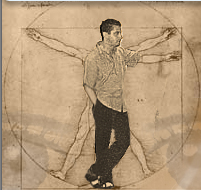| Home > Papers > Metaphysics |
|


| Sitemap |
| Print view |
| Login |
Metaphysics
“Egalitarian vs. Elitist Plenitude.” Philosophical Studies 2022.
I put on the agenda a decision that plenitudinists face: whether the plenitude of material objects coinciding at a location are all ontologically "on a par" or there is one (or a few) of special ontological standing (e.g., in that the other coincidents ontologically depend on it).
“The Concreteness of Objects: An Argument against Mereological Bundle Theory.” Synthese 2021.
As part of my attempt to make the world safe for nominalism, I argue that concrete particulars cannot be assayed away, as the bundle theory attempts to do - not even when we consider what I take to be the best version thereof, namely, the mereological trope bundle theory.
“Nominalism and Material Plenitude.” Res Philosophica 2021.
The idea of “material plenitude” has been gaining traction in recent discussions of the metaphysics of material objects. My main goal here is to show that this idea may have important dialectical implications for the metaphysics ofproperties– more specifically, that it provides nominalists with new resources in their attempt to reject an ontology of universals. I will recapitulate one of the main arguments against nominalism – due to David Armstrong – and show how plenitude helps the nominalist overcome the argument.
“Essentialist Plenitude and the Semantics of Proper Names.” Metaphysics 2019.
Plenitude is the view, roughly, that wherever there's one material object there's a bazillion others coinciding with it (the only difference being in which of their properties are essential to them). I argue that plenitude produces an embarrassment for both descriptivist and causal theories of the reference of proper names, and that it suggests that our use of proper names is infected by pervasive semantic indecision about which among many coincidents they refer to.
“What is Ontology? A Dialogue.” Think 2019.
Although every philosopher knows an ontological problem when s/he sees one, no two philosophers seem to have the same idea of what ontology is in the abstract. This dialogue articulates my view of what ontology is, and tries to do it in a way that might be enjoyable to read.
“Metaphysics and Conceptual Analysis: Experimental Philosophy's Place under the Sun.” In D. Rose (ed.), Experimental Metaphysics 2017.
I present a not-particularly-novel picture of the place of conceptual analysis in metaphysics, then discuss the role experimental philosophy might have within this project.
“Philosophy as Total Axiomatics: Serious Metaphysics, Scrutability Bases, and Aesthetic Evalaution.” Journal of the American Philosophical Association 2016.
My view of what philosophy/metaphysics is about...
“Brentano's Latter-day Monism.” Brentano Studien 2016.
This 2500-word piece discusses a dictation from January 1915 I dug up, where Franz Brentano defends a kind of Schaffer-style priority monism.
“Thought and Thing: Brentano's Reism as Truthmaker Nominalism.” Philosophy and Phenomenological Research 2015.
What are the truthmakers of "Socrates is wise" and "Socrates is Greek"? According to Brentano, as I interpret him, they are two numerically distinct but collocated concrete particulars, Wise-Socrates and Greek-Socrates. I explain this view and air a defense of it.
“Experiencing the Present.” Analysis 2015.
How to reconcile a B-theoretic metaphysics of time with an A-theoretic phenomenology of termporal experience - without an error theory of temporal experience? This paper makes a suggestion.
“How to Speak of Existence.” Themes from Ontology, Mind, and Logic: Essays in Honor of Peter Simons 2015.
Articulates and defends an unusual approach to existence talk, drawn from Brentano, according to which to say that X exists is to say that the right attitude to take toward X is the attitude of believing in it.
“The Epistemological Challenge of Revisionary Metaphysics.” Philosophers' Imprint 2013.
I present a systematic challenge to the viability of revisionary metaphysics: show me epistemic grounds on which to believe that one revisionary-metaphysical theory in some area is more likely to be true than its competitors.
“Kantian Monism.” Philosophical Papers 2012.
What I call Kantian monism is the view that the world as a whole exists mind-independently, but it decomposes into parts only mind-dependently. This paper tries to articulate the view in a more precise manner, then make a case that this is rather a good view to have.
“Two Defenses of Common-Sense Ontology.” Dialectica 2011.
I argue that, given certain plausible (though not uncontroversial) meta-ontological principles, there are a priori restrictions on how much our considered ontology can diverge from common-sense ontology.
“The Dispensability of (Merely) Intentional Objects.” Philosophical Studies 2008.
The ontology of (merely) intentional objects is a can of worms. If we can avoid ontological commitment to such entities, we should. In this paper, I offer a strategy for accomplishing that.
“Composition as a Secondary Quality.” Pacific Philosophical Quarterly 2008.
I propose a new account of mereological composition, according to which (roughly) there is a y that the xs compose just in case a normal intuiter would, under normal conditions, intuit that there is.
“Tropes and Facts.” Metaphysica 2005.
I argue that tropes and facts are two kinds of abstract particular, distinguished by the linguistic expressions appropriate for picking them out. Tropes are picked out by perfect nominals (whose parent sentence feature a copula), facts by imperfect nominals (whose parent sentence featured either a verb or a copula).
“Trope Theory and the Metaphysics of Appearances.” American Philosophical Quarterly 2004.
A traditional account of appearances construes them as mental particulars, such as sense data. In this paper, I offer a trope-theoretic account of appearances that treats them as external, non-mental particulars.
Appearance and Reality
